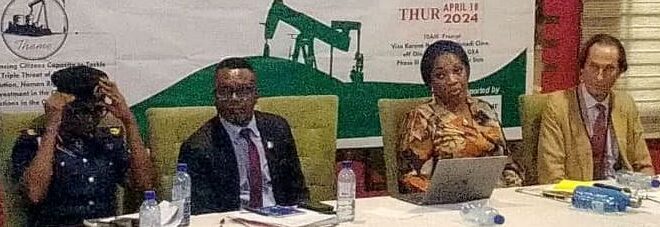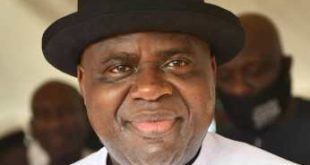By Pius Dukor
The Human and Environmental Development Agenda (HEDA) Resource Centre, in collaboration with the National Human Right Commission (NHRC), has ended a one-day event with the theme: ‘Enhancing Citizens Capacity to Tackle the Triple Threat of Environmental Pollution, Human Rights Violations and Divestment in the Oil and Gas Sector in the Oil Producing Area.’
The programme was held in Port Harcourt the Rivers State capital.
In an interview, chairman, HEDA, Mr. Olanrewaju Suraju, said the purpose of the event was to highlight the role of the community in human rights protection, especially in the issue of oil divestment, adding that the one done in the past was done without considering the input of the communities who had suffered seriously due to oil pollution in their area.
He explained that oil companies and the Federal Government, with regards to divestment, must consider all stakeholders and put them on the table to discuss what this all important issue is and how it affects them, noting that divestment in the Niger Delta must be done with integrity and fairness, without excluding community people.
“The stakeholders have the passion, coming from their past experience where the international oil companies left the communities without proper information,” he said.
Suraju stated that the sentiment is because proper investigation has not been conducted in the areas, while the oil companies that polluted the environment have not clean up, adding that the framework on divestment must be followed properly.
When asked what he intends to achieve by conveying the town hall meeting. He expressed optimism that this time around no divestment can take place without taking into consideration the long years of oil pollution and the destruction of the ecosystem by the oil multinationals operating in the communities.
In his presentation, Engr. Gbenga Komolafe, chief executive of Nigerian Upstream Petroleum Regulatory Commission (NUPRC), represented by Dr. Kelechi Ofoegbu, executive commissioner, Corporate Services and Administration, NUPRC said that there is a checklist every divestment must follow before government will approve such divestment, which includes legal requirements, community consideration, financial considerations, health and safety among others.
He said that the checklist is a prerequisite before any divestment can take place, which will be done through a written document to the Minister of Petroleum.
He further explained that under oil and gas operation, pipeline vandalism, communal conflict must be eliminated, while citizens’ participation and action is an important factor.
“Divestment will not occur until the matter listed be address by the commission with other government agencies as part of the regulatory requirements,” he said.
“We want the divestment to be done in a right manner, and we are standing with the Nigerian people,” he explained.
On the Petroleum Industrial Act, he said so far about 107 boards have been inaugurated by the authorities while 43 applications are still hanging due to litigation.
Community representatives present at the event however expressed concern that before any divestment environmental audit should be done.
In their separate presentations, Emem Okon of Kebetkache Women Development and Resource Centre stated that women are more vulnerable and they suffer exclusion in the oil and gas business in the Niger Delta, while Celestine Akpoobari called for a more serious way to bring back the days of demonstration.
Nicholas Hildyard, co-director, Corner House United Kingdom, in his document titled, ‘Shell’s Proposed Sale of SPDC, Red flags over Renaissance’s Finances,’ stated that they have raised concern over the proposed sale which appear to be in breach of NUPRC’s divestment rules, and promised to expose the document to both government, civil society organisations and the public, noting that Renaissance is a new company with no track record that could be accessed and it has no financial history among other flaws.
 PH Mundial – Port Harcourt Online Newspaper News Across The Region
PH Mundial – Port Harcourt Online Newspaper News Across The Region





